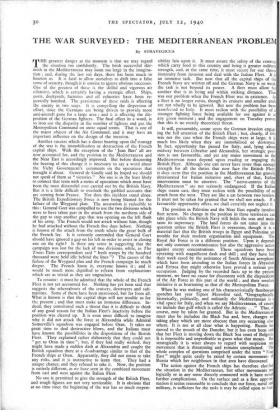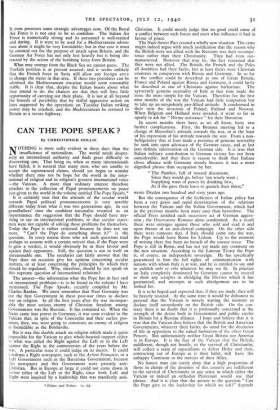THE WAR SURVEYED : THE MEDITERRANEAN PROBLEM
By STRATEGICUS
THE greatest danger at the moment is that we may regard the situation too confidently. The brisk successful skir- mish in the Mediterranean may loom too large in the imagina- tion ; and, during the last ten days, there has been much to hearten us. It is fatal to allow ourselves to drift into a false sense of security, though it is unwise to ignore obvious successes. One of the greatest of these is the skilful and vigorous air offensive, which is certainly having a strategic effect. Ships, ports, dockyards, factories and oil refineries have been re- peatedly bombed. The persistence of these raids is affecting the enemy in two ways. It is compelling the dispersion of effort, since the Germans are being driven to provide more anti-aircraft guns for a large area ; and it is affecting the dis- position of the German fighters. The final effect in a word, is to iron out the disparity in the number of fighters and put the Metropolitan Command on more equal terms. That is one of the major objects of the Air Command, and it may have an important influence on the design of the invasion.
Another success which has a direct bearing upon the strategy of the war is the immobilisation or destruction of the French capital ships. With the exception of the ' Jean Bart' all are now accounted for, and the position in the Mediterranean and the Near East is accordingly improved. But before discussing the bearing of this change it is necessary to say a word about the Vichy Government's comments on the operations that brought it about. General de Gaulle said he hoped we should not speak of them as " victories." No one is in the least likely to connect that term with a series of operations which must have been the most distasteful ever carried out by the British Navy. But it is a little difficult to overlook the garbled accounts that are coming from France. Nor does this incident stand alone. The British Expeditionary Force is now being blamed for the failure of the Weygand plan. The accusation is reducible to this : General Gort was compelled to use the two divisions which were to have taken part in the attack from the northern side of the gap to stop another gap that was opening on the left flank of his army. The French would not attack without him, though he had attacked without the French five days before. Nothing is known of the attack from the south where the great bulk of the French lay. Is it seriously contended that General Gort should have ignored a gap on his left in order to assist in closing one on the right? Is there any sense in suggesting that the campaign was lost for the lack of two divisions, while, as The Times Paris correspondent said " fresh troops by the hundred thousand were held idle behind the lines "? The causes of the failure of the Weygand plan and the French campaign lie much deeper. The French know it, everyone knows it ; and it would be much more dignified to refrain from explanations which are as trivial as they are ungracious.
To resume : it must be admitted that the whole of the French Fleet is not yet accounted for. Nothing has yet been said that suggests the whereabouts of the cruisers, destroyers and sub- marines. Some of them have been mentioned, but far from all. What is known is that the capital ships will not trouble us for the present ; and that must make an immense difference. In- deed, they constituted such a threat that it is difficult to think of any good reason for the Italian Fleet's inactivity before the position was cleared up. It is even more difficult to imagine why it did not attack the force at Alexandria while Admiral Somerville's squadron was engaged before Oran. It takes no great time to deal destructive blows, and the Italians must have known the possibilities in the dispositions of the British Fleet. They explained rather elaborately that they could not " get to Oran in time "; but, if they had really wished, they might have made a sudden dash at Alexandria and caught the British squadron there at a disadvantage similar to that of the French ships at Oran. Apparently, they did not mean to take any risks, and it is instructive to learn that. They had a unique chance, and they refused to take it. Now, the position is entirely different, as we have seen in the combined movement from east and west against the Italian Fleet.
No one is permitted to give the strength of the British Fleet, and rough figures are not very serviceable. It is obvious that at no time since the beginning of the war has so much respon- sibility lain upon it. It must assure the safety of the convoys which carry food to this country and bring it greater military strength, and, at the same time, it must secure for our shores immunity from invasion and deal with the Italian Fleet. It is an immense task. But now that all the capital ships of the French Navy are written off and the German Navy is so weak, the task is not beyond its power. A fleet must allow for another that is in being and within striking distance. That was our problem when the French Fleet was in existence. As a fleet it no longer exists, though its cruisers and smaller craft are not wholly to be ignored. But now the problem has been transferred to Italy. It must reckon with the possibility of a stronger fighting force being available for use against it at any given moment ; and the engagement on Tuesday proves that this is no merely theoretical threat.
It will, presumably, count upon the German invasion engag- ing the full attention of the British Fleet ; but, clearly, if this was not the case when the French ships were at large, it is much less likely when they are immobilised or destroyed. In fact, opportunity has passed for Italy; and, lying about midway between Gibraltar and Alexandria, her strategic posi- tion is not favourable, and yet any major movement in the Mediterranean must depend upon evading or engaging the British Fleet. Although one can never have more than enough strength for all the duties that now face the British Fleet, it does seem that the position in the Mediterranean has gravely deteriorated for Italian initiative and, short of that, Italian intervention must be abortive. The " nerve-centres of the Mediterranean " are not seriously endangered. If the Italian ships steam east, they must reckon with the possibility of an attack from the west. They are like a cat between two terriers. It must not be taken for granted that we shall not attack. If a favourable opportunity offers, we shall certainly not neglect it.
The position in Palestine and the Near East equally involves fleet action. No change in the position in these territories can take place while the British Navy still holds the seas and main- tains its supremacy. The land forces do not enter into the question unless the British Fleet is overcome, though it is a material fact that the British troops in Egypt and Palestine are notable for their modem organisation and equipment. The Royal Air Force is in a different position. Upon it depends not only constant reconnaissance but also the aggressive action against enemy concentrations. These squadrons have been operating with magnificent dash and skill ; and they have had their work eased by the assistance of South African aeroplanes which have been attending to the Italian forces in Abyssinia and Eritrea that might otherwise have proved a serious pre- occupation. Judging by the recorded facts up to the present moment, we have no cause for discontent with the dispositions of the Air Force in this part of the world ; and their resolute initiative is as heartening as that of the Metropolitan Force.
When he was making one of his characteristically flamboyant speeches last year Signor Mussolini said, "Geographically, historically, politically, and militarily the Mediterranean is a vital space for Italy, and when we say Mediterranean, of course we include that gulf which is called the Adriatic .. ." That, of course, may be taken for granted. But in the Mediterranean must also be includea the Black Sea and, here, changes are taking place which are more obscure than any occurring else- where. It is not at all clear what is happening. Russia has moved to the mouth of the Danube; but it has even been said that her Fleet is moving down the Black Sea coast of Bulgaria. It is impossible and unprofitable to guess what that means. But strategically it is wiser always to regard with suspicion any movement that is threatening and remains unexplained. The whole complex of questions comprised under the term " Near East " might quite easily be raised by certain movements of Russia which her neighbours in that area have discovered. The action against the French ships has therefore clarified the situation in the Mediterranean, but other movements nee logically or in any sense directly connected with it have raised further complications. On the surface and as a first approxr mation it seems reasonable to conclude that our force, naval and military, is sufficient for the tasks it may be called upon to fact It even possesses some strategic advantages now. Of the Royal Air Force it is not easy to be so confident. The Italian Air Force is numerically strong and its personnel is well-trained and daring. If it were to be used for a Mediterranean adven- ture alone it might be very formidable; but in that case it must be counted out for the purpose of attack upon Britain, and the German Air Force has not only lost heavily but is being dis- tracted by the action of the bombing force from Britain.
What may emerge from the Black Sea we cannot guess. The Turkish position is at present assured; and it seems unlikely that the French force in Syria will allow any foreign army to change the status in that area. If these two postulates can be admitted the Mediterranean situation would seem reasonably stable. It is clear that, despite the Italian boasts about what they intend to do, the chances are that they will have little opportunity of carrying out their plans. It is not at all beyond the bounds of possibility that by skilful aggressive action on lines suggested by the operations on Tuesday Italian striking power may be crushed, and the Mediterranean be restored to Britain as a secure highway.



























 Previous page
Previous page